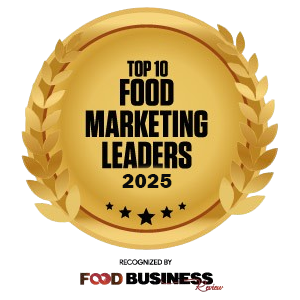Thank you for Subscribing to Food Business Review Weekly Brief
Cecilia Bottai Mondino has extensive experience in the food and beverage industry. She specializes in marketing management, customer insight, market planning and FMCG. A strategic leader, Cecilia holds a degree in Economics from University of São Paulo and excels in driving impactful marketing strategies.
Insights about Professional Journey and Current Responsibilities My role is a constant juggling act, balancing several demanding areas. One moment I’m deep in business discussions, strategizing how we’ll hit our year-end targets in terms of performance, profitability and financials. The next, I’m switching gears to collaborate with agencies, driving creative strategies and sharpening our communications. On top of that, HR matters—like team dynamics, workplace culture and recruitment—demand my attention as well. These are the core functions I manage daily. There’s innovation as well which requires me to constantly look ahead, stay on top of emerging trends and rethink how we can do things smarter and better in the future. The Game-Changing Trends of the Future In Brazil, beer remains one of the most popular alcoholic beverages, deeply ingrained in the culture. While there isn’t a strong shift toward other types of alcohol, a noticeable trend toward moderation is emerging. People are becoming more mindful of their drinking habits, opting to reduce consumption or take alcohol-free days. This has fueled the rise of non-alcoholic alternatives like beer 0.0 and other adult beverages without alcohol. Another important trend revolves around how brands engage with consumers. The era of top-down communication is fading, replaced by a demand for meaningful conversations and cultural engagement. Brands are no longer simply broadcasting messages via TV - they must now take a stance on important issues, engage in real-time dialogue and actively listen to their audience. The digital age has amplified these expectations, as consumers seek more than just brand messaging—they want to be entertained, surprised and provided with memorable experiences. For beer brands in particular, with their history of fostering enjoyment and excitement, the challenge is to continue innovating and delivering fresh, captivating interactions. These evolving trends are shaping both consumer behavior and the way brands interact in the marketplace. “Marketing is no longer just about broadcasting messages; it's about engaging in real-time dialogue and creating meaningful connections with consumers.” Harnessing the Latest Tech to Elevate Our Marketing There are several dimensions where technology is transforming the beer industry. While beer has been brewed for over 2,000 years, technological advancements are enhancing production efficiency. In packaging, our innovation is focused on sustainability and adding functionality to offer more convenience and value to consumers. On the product side, the focus is on delivering functional benefits without compromising taste. Heineken 0.0 is a prime example, as non-alcoholic beers were previously considered subpar, but now you have a high-quality, alcohol-free beer. Another example is Amstel Ultra, a beer with fewer calories and no gluten that offers great flavor. The goal here is to introduce new functionalities while maintaining the beer’s taste and overall experience. Technology also plays a key role in communication with consumers. It's about using data to better segment, understand different consumer groups and engage them in meaningful conversations. This helps brands stay ahead of trends and deliver exactly on consumers’ expectations. While these insights may not always be visible to consumers, they are crucial in shaping more personalized and effective communication, ultimately enhancing the consumer experience. Marketing at Heineken is becoming increasingly strategic, as we are the ones anticipating where the world is headed. We're responsible for shaping the portfolio strategy and setting priorities because people consume beer for different reasons. Sometimes they drink to relax, sometimes to have fun and other times to celebrate with friends. These varying motivations require a diverse portfolio that caters to all these different needs and marketing plays a key role in understanding and addressing them. In addition to understanding consumer motivations, we also consider pricing. Brazil, for instance, is an incredibly diverse country with a wide range of social classes and we need to offer beers that fit different price points. Marketing is crucial in determining how to cater to each need and budget, as well as how to position our brands to ensure they remain relevant. This strategic vision guides everything that follows, including sales execution and overall business operations. Marketing also plays a central role in driving innovation and identifying future growth opportunities. While Heineken has always been a brand-building company, the role of marketing has expanded further as our portfolio has grown and is critical in shaping the company's future direction. The Tech-Driven Future of Marketing: What’s Next? I view technology as a powerful tool that makes our lives easier and helps us accomplish things efficiently. However, no matter how advanced it becomes the core human need for connection, interaction, belonging and shared experiences will never fade. For us, it’s not just about selling beer—we’re in the business of creating connections and that’s something technology will never replace. If we keep our focus on delivering the best experiences, crafting the best products and making genuine human connections, technology serves as a valuable enabler, not the main attraction. It can help us move faster, be more efficient and reach more people, but the heart of what we do is bringing people together in real life. Whether people are connecting in person or through digital platforms like gaming, the essence of human connection remains irreplaceable. Our job is to understand why people seek connection and why they want to come together and never lose sight of that purpose. Technology will evolve, but the human need for connection is timeless—and that’s where our focus will always be. Hard-Earned Lessons Every Marketer Should Know It’s essential to stay curious about why people behave the way they do. A great marketer is someone who constantly observes the world and questions things—why are people drinking this, why are they acting that way? Our role is to be the “ears” of the company, gathering these insights and turning them into actionable strategies. However, it's easy to become too internally focused, fixating on KPIs, targets, sales and business performance and forgetting to pay attention to the world outside. The key is to investigate and understand the external factors driving consumer behavior. It is also important to cultivate strong partnerships. Innovation and great ideas can come from anywhere—a can supplier, an agency or even social media platforms like TikTok or Instagram. Building strong relationships with these partners encourages them to bring fresh, bold ideas to the table, knowing we’ll support and believe in their innovations. Ultimately, it’s about staying outward-focused and open to new ideas, because creativity and innovation can come from any unexpected place.



